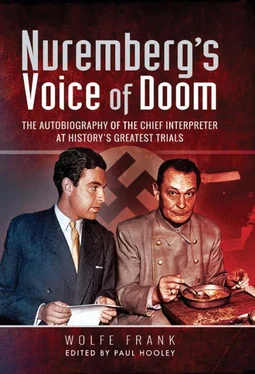For obvious reasons every officer in England tried to stay away from such an outfit for, in addition to commanding such splendid human material, they would have to spend endless days supervising manual labour, which would be alright for a short period but would be soul-destroying if it were to last for a year.
Much later some sugar coating was applied to the picture. ‘Auxiliary’ was dropped so the Corp’s title became Military Pioneer Corps (MPC). After the war the crowning glory ensued when the word ‘Royal’ was added to make it the Royal Military Pioneer Corps and its members were even armed.
In its later days the corps had its fair share of excellent types, however in 1941 at West Auckland we were considered to be a bottom-of-the-barrel-scraping operation. Billeted in a draughty memorial hall, we were commanded by a roughneck sergeant who was proud of his Royal Navy record – having been held in detention barracks and jailed for, amongst other achievements, being a criminal homosexual.
The duties were tough, particularly for those of us who had become physically unfit during our six months in an internment camp, but we didn’t mind that too much and went about our work with a sort of sporting enthusiasm. However, our situation was aggravated by the existence of some pretty despicable types who cow-towed to the sergeant, assisted him with his black-market activities and got themselves some of the more comfortable jobs.
To get these concerns off my chest I wrote a long letter to Humphrey Sykes who had the brilliant idea of sending a copy, complete with my name, to the War Office, addressed to the King Pioneer – a general whom he knew. Humphrey probably felt that such action would accelerate the end of the ‘darkest hours that precede dawn’. He also observed that this kind of thing was detrimental to the reputation of the British Army (with which I heartily agreed) and he assured me that there would be absolutely no repercussions for me.
The King Pioneer’s office copied my letter and sent it to my own CO and the Deputy Director of Labour (DDL), the top Pioneer in the Army Command where I was stationed.
The CO, an outstanding case of an ‘Officer and Gentleman,’ having read my letter swore, according to a friend of mine who was a clerk in his office, that he would see me in the ‘Glasshouse’ (military prison). Fortunately, the DDL decided otherwise. By now we had left West Auckland and moved to Nissen huts [9] A Nissen hut is a prefabricated steel structure, made from a half-cylindrical skin of corrugated steel. Invented by Major Peter Nissen, the huts were used extensively during the Second World War.
in the grounds of Hoddom Castle (usually referred to as either Sodom or Goddamn Castle) near Ecclefechan in Scotland. The work had changed from loading sacks to digging a ditch for a pipeline.
I was submerged in this ditch when an NCO called out to me ‘The DDL wants to see you immediately’ Hell, I thought, this means trouble.
The DDL, Colonel Innes, a huge man, was soon waving a copy of the letter to Humphrey in my face and asked, ‘Are you the Frank who wrote this silly letter?’
It was not said unkindly, so I took the bull by the horns.
‘Yes sir,’ I replied, ‘and if I may say so, sir, I don’t feel that it is a silly letter. It is stating facts as I am sure you will discover if you go into the situation.’
‘That’ stated the boss ‘may or may not be so, but one doesn’t go and write letters like this all over the place. I’ll look into it. Be more discreet in future.’
The interview was over.
Shortly afterwards our beloved sergeant disappeared to be followed by the CO. There were, indeed, no repercussions for me. On the contrary, I was ‘given a stripe’ – made a Lance Corporal – by the new CO and my name went forward as an officer’s candidate. The War Office had decided that we former internees could, after all, be commissioned, though only in the Pioneer Corps. This was not for me and I declined the honour.
I then got wind of a new regulation under which we could be commissioned in certain fighting regiments. I asked my CO to put my name forward and was sent to a selection board for an interview.
Another seven candidates went with me, and the whole process started badly – one candidate went before the board whilst the next waited in a small office. Somebody had accidentally dropped a teargas bomb, and by the time I entered the boardroom I was crying bitter tears.
There were no less than five colonels present. Two took no part in the proceedings. Of the other three one was cross-eyed, the second almost deaf and the third, who conducted the interview, stammered badly.
‘W-wwwhat rrr—rank a-a-are you?’ he enquired.
‘Lance Corporal, Sir,’ I sobbed.
Then I was asked a lot of questions about my past: where I came from? what school had I attended? what experience did I have? what were my hobbies?
After some minutes the semi deaf colonel fixed me with an icy stare and said, ‘I say, Frank, why aren’t you an NCO?’
‘But I am, Sir,’ I said after a quick look at the solitary chevron on my sleeve, ‘I am a Lance Corporal.’
‘He should have been made an NCO before coming here,’ said the hard-of-hearing colonel.
‘Thahhts w-w-w-hat he i-i-is’ announced the chairman, ‘a-a-a L-l-lance C-c-c-corporal.’
‘Oh, is he? Good.’ Then there was sustained silence.
‘Thank you, Frank,’ someone said, ‘that’ll be all. We’ll let your CO know the result’.
The result was that none of us passed. However, I kept making applications for a transfer to a fighting unit and was interviewed by two very inquisitive gentlemen from Military Intelligence when aliens became eligible for transfer to paratroop regiments – I was turned down as being too old – I was then twenty-nine!

20. AN OFFICER AND A GENTLEMAN
IN MAY 1943, 240 COMPANY WAS DISSOLVED and I was transferred to another Company at Northampton. Shortly after my arrival I was informed that I would, at last, be transferred to a fighting unit.
I attended another selection board, filled in endless forms and went through various intelligence tests. The result was a transfer to the Royal Armoured Corps (RAC) Training Regiment at Farnborough in Hampshire, where I arrived at the end of July 1943. After two years seven months my hole-digging days were over, and I had to learn to be a soldier.
For sixteen weeks I drilled, learnt a great deal about armoured vehicles, wireless, rifles, bombs, revolvers and map reading and I received a heavy dose of physical training. The CO then selected me as an officer candidate. I attended a special course, run by the regiment in order to equip me for a War Office Selection Board (WOSB) that I was told I would have to pass before going to an Officer Cadet Training Unit (OCTU). For weeks I did special PT, went over obstacle courses, did night exercises, endless route marches and attended countless lectures.
Then, in February 1944, came the selection board. With it the War Office had found an excellent solution to a difficult problem.
At the beginning of the war one had to be born into the right families to become an officer. Men with the proper background and education could be fairly certain they would receive a commission. By 1944 however the country was running out of such elite types and a system had to be devised to draw on the rank and file of ‘ordinary’ human beings in order to find the men who were psychologically, physically and intellectually suitable to hold a commission.
Читать дальше













